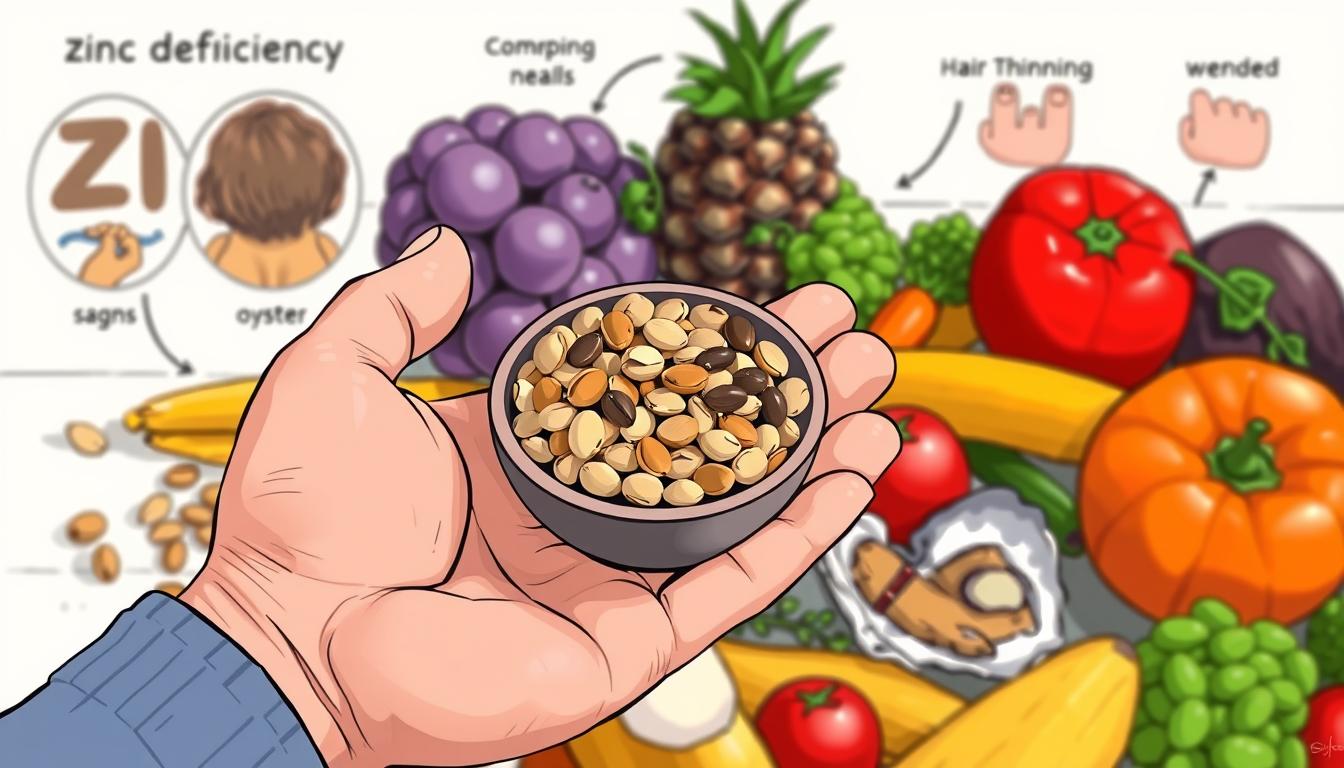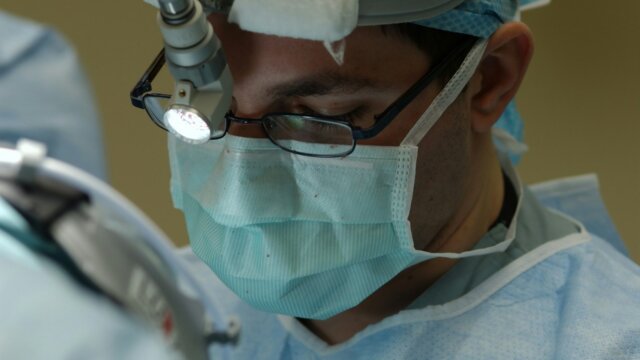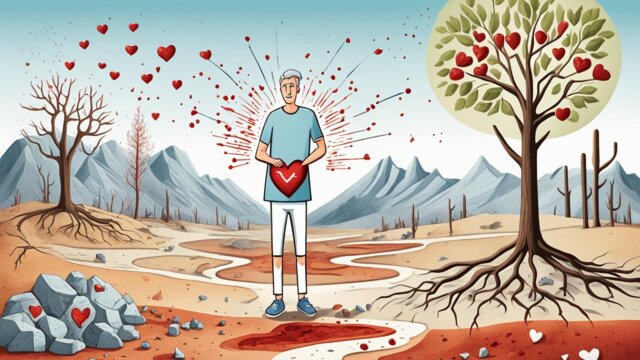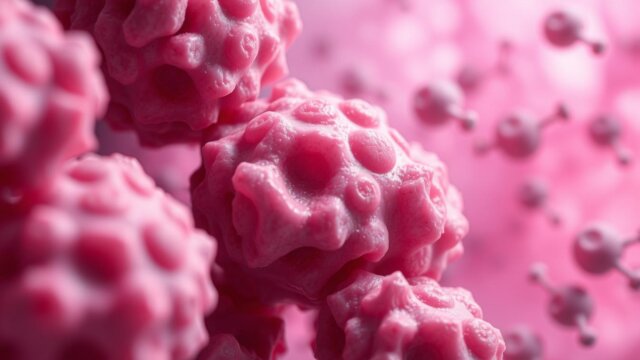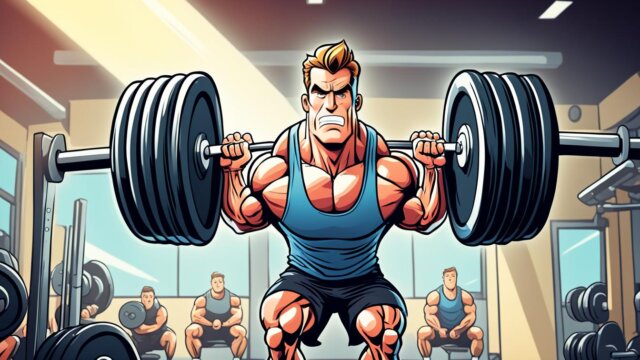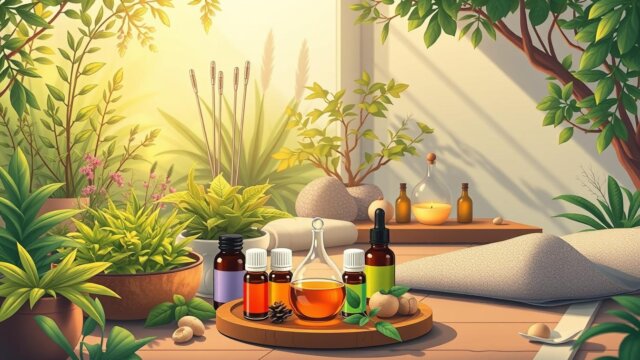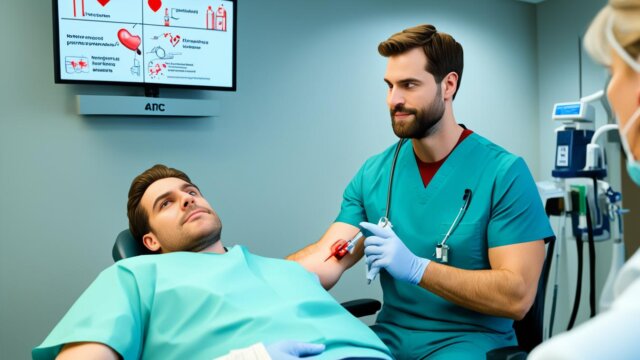FTC disclaimer: This post may contains affiliate links and we will be compensated if you click on a link and make a purchase.
Did you know 17.3% of the world’s population lacks zinc? Zinc is key for our immune system, healing wounds, and growing cells. Without enough zinc, we can get zinc deficiency. This leads to many uncomfortable symptoms.
In this guide, we’ll look at zinc deficiency signs and symptoms. We’ll also cover common causes and risk factors. Plus, we’ll share home remedies and natural treatments to boost your zinc levels.
Key Takeaways
- Zinc deficiency can cause skin changes, hair loss, frequent infections, and slow wound healing.
- Causes of zinc deficiency include poor absorption or inadequate dietary intake, especially in vegetarians, vegans, and those on restricted diets.
- Zinc deficiency can affect growth and development in children and during pregnancy.
- Zinc supplements can help treat deficiency, but should not exceed 40mg per day.
- Consuming zinc-rich foods like dairy, poultry, meat, and seafood can help prevent zinc deficiency.
What is Zinc?
Zinc is a key mineral for the body’s health. It helps the immune system, heals wounds, and supports the senses of taste and smell. It also aids in growth and development, especially in kids and teens. Since the body doesn’t store zinc, we get it from food.
Zinc’s Role in the Body
Zinc is vital for many body functions. It keeps the immune system strong, helps wounds heal, and supports taste and smell. It’s also key for cell growth, making proteins, and DNA. It’s especially important for kids and pregnant women.
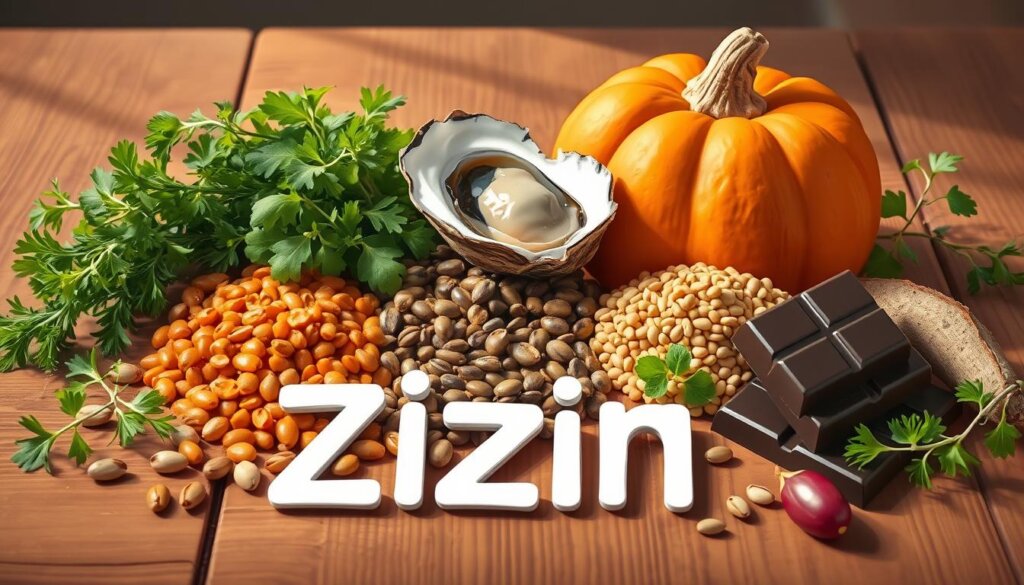
Adults need 8 – 11 mg of zinc daily. Foods like meat are better for zinc than plants. Zinc might also help with Wilson’s disease and sickle cell disease.
“Zinc is a vital mineral that supports numerous essential bodily functions, from immune health to sensory perception. Maintaining adequate zinc levels is crucial for overall well-being.”
Zinc is essential for many health functions. Getting enough zinc through food or supplements is important.
Signs and Symptoms of Zinc Deficiency
Zinc deficiency can show up in many ways, affecting your health. You might notice changes in your skin, like eczema. Hair loss is also a common sign of not enough zinc. Plus, you could get sick more often because zinc helps your immune system.
Wounds taking longer to heal is another sign of zinc deficiency. Normally, wounds heal in 2-3 weeks. But if it’s taking longer, your body might need more zinc. You might also have trouble tasting and smelling things, as zinc is key for these senses.
Zinc deficiency can really affect your health, including your brain and blood sugar. You might feel foggy, have trouble focusing, and even lose weight without trying. Kids might grow slower and puberty might be delayed if they don’t have enough zinc.
Symptom | Description |
|---|---|
Skin changes | Eczema-like skin conditions |
Hair loss | Increased hair shedding |
Frequent infections | Weakened immune system |
Delayed wound healing | Slow wound recovery (2-3 weeks) |
Loss of taste and smell | Decreased senses |
Cognitive issues | Brain fog and difficulty concentrating |
Slow growth | Delayed development in children |
Unexplained weight loss | Decreased appetite and mood changes |
Diabetes risk | Impaired blood sugar control |
Knowing the signs of zinc deficiency can help you take action. This way, you can keep your health and well-being in check.
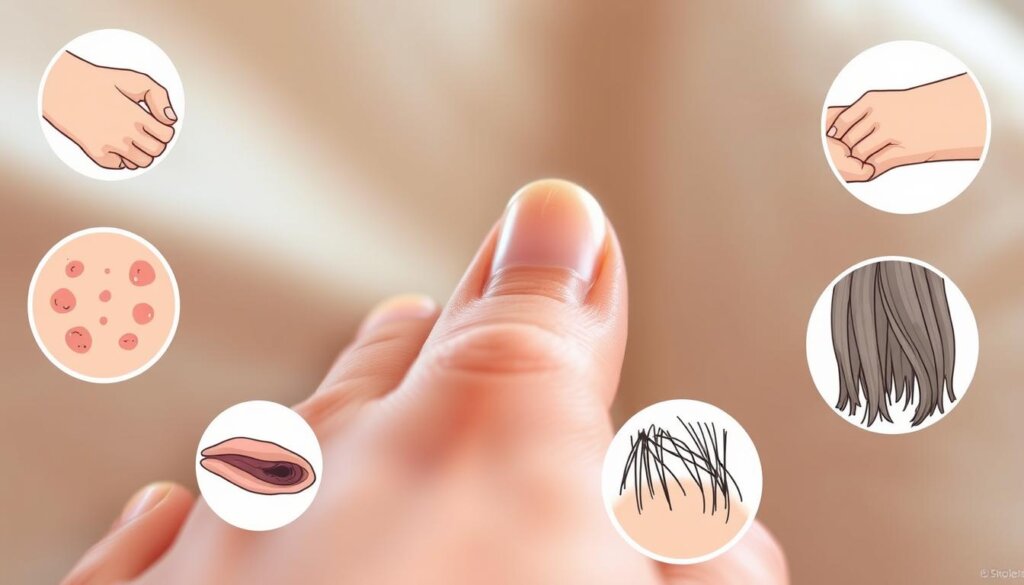
Causes of Zinc Deficiency
Zinc deficiency can happen for many reasons. It might be because your body can’t absorb zinc well or you don’t eat enough zinc-rich foods. Medical issues like stomach problems can also cause zinc deficiency. Some medicines and diets, like vegetarian or vegan, can raise your risk too.
Risk Factors
Some people are more likely to get zinc deficiency. Babies, pregnant women, and older folks are at higher risk. Also, those with long-term illnesses, stomach issues, or taking certain drugs might face zinc deficiency.
- Gastrointestinal diseases like Crohn’s disease, celiac disease, and ulcerative colitis can raise zinc deficiency risk.
- Medicines like diuretics, antibiotics, and penicillamine for rheumatoid arthritis can lower zinc levels.
- Vegetarians and vegans might face higher zinc deficiency risk because plant-based diets have less zinc.
Knowing these risks is key. Make sure to eat well and consider supplements if needed.
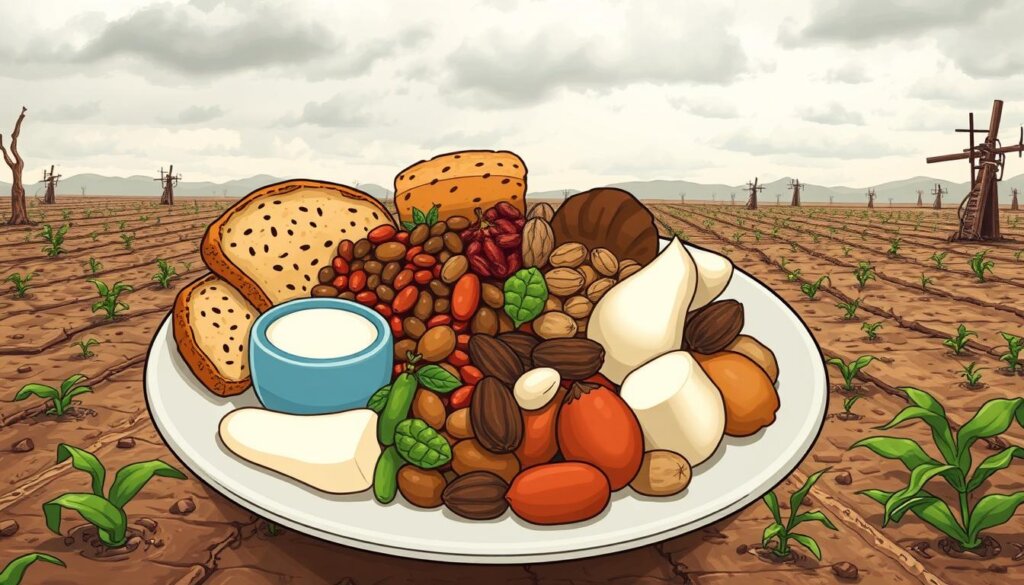
Diagnosing Zinc Deficiency
Finding out if you have a zinc deficiency is hard. Zinc is found in tiny amounts in your body’s cells. This makes it hard to find with just a blood test. Your doctor might need to do a blood plasma test, a urine test, or check your hair.
Your doctor might suggest taking zinc supplements to see if you feel better. This can help figure out if you have a deficiency. The normal amount of zinc in your blood is different for kids and adults.
Tests for zinc deficiency might not always be clear. Zinc is found in small amounts in your cells. About 1.1 billion people worldwide don’t get enough zinc because of their diet.
Age Group | Recommended Zinc Intake |
|---|---|
0-6 months | 2 mg |
7-12 months | 3 mg |
1-3 years | 3 mg |
4-8 years | 5 mg |
9-13 years | 8 mg |
14 years and older | 11 mg for males, 9 mg for females |
Zinc is important for your body. It helps your immune system, aids in cell growth, and keeps your sense of smell and taste sharp. Without enough zinc, you might get diarrhea, feel cold, have rashes, see poorly, or lose weight.
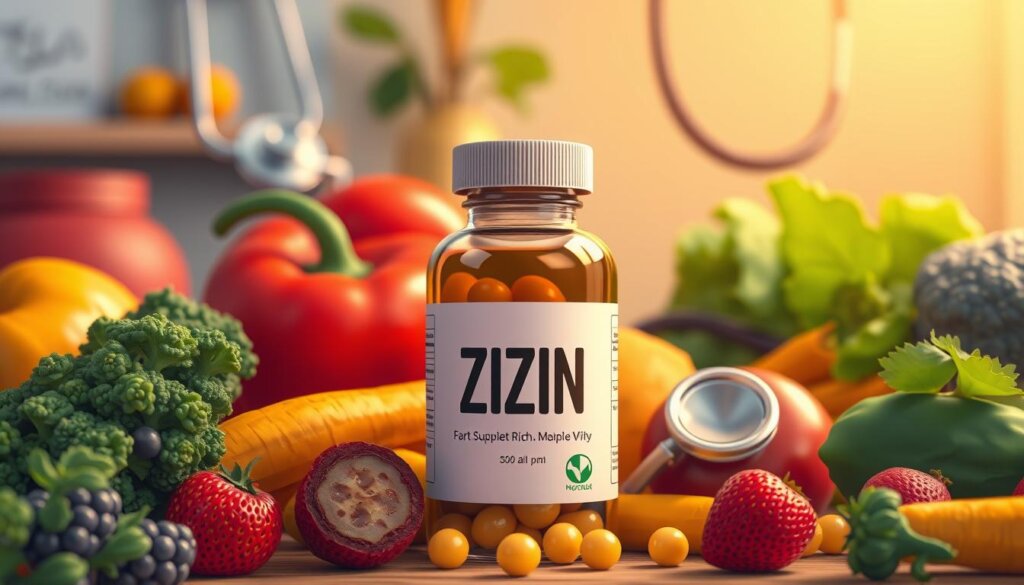
If you think you might not have enough zinc, talk to your doctor. They can help you decide what to do next. This might include changing your diet, taking supplements, or doing more tests.
Home Remedies for Zinc Deficiency Signs and Treatment
Dietary Changes
To fight zinc deficiency, start by eating more zinc-rich foods. Red meat, poultry, seafood, dairy, beans, nuts, and grains are great choices. If you don’t eat meat, focus on plant-based zinc sources like legumes, seeds, and fortified cereals.
Try to soak beans and use leavened grains to help your body absorb zinc better. This can really help your body use the zinc you eat.
Zinc-Rich Food | Zinc Content |
|---|---|
Oysters (3 oz) | 74.1 mg (673% DV) |
Beef chuck roast (3 oz) | 8.44 mg |
Pork chops (4 oz) | 2 mg |
Alaskan king crab (3 oz) | 6.48 mg (59% DV) |
Cooked lobster (3 oz) | 6.18 mg |
Chickpeas (100 g) | 1.5 mg |
Kidney beans (1/2 cup) | 0.9 mg |
Cashews (50 g) | 3 mg |
Oats (1/2 cup) | 1.5 mg |
Hemp seeds (3 tbsp) | 3 mg |
Pumpkin seeds (1 oz) | 2.2 mg |
Sesame seeds (1 tbsp) | 0.6 mg |
Tofu (4 oz) | 1.8 mg |
Eating these zinc-rich foods daily can help fix zinc deficiency and its symptoms. Remember, eating right every day is important for good zinc levels.
Zinc Supplements
If you can’t get enough zinc from food, your doctor might suggest supplements. Zinc supplements come in different types like zinc gluconate and zinc sulfate. Always follow the dosage to avoid side effects like diarrhea.
Adults need 8 – 11 mg of zinc each day. Some groups, like the elderly and alcoholics, might need more. Too much zinc can harm your body.
Research shows zinc supplements can help with many health issues. In Bangladesh, zinc helped reduce pneumonia and diarrhea in kids by 15%. It also treats acne well.
Don’t take more than 40 mg of zinc supplements daily without a doctor’s advice. Our bodies absorb 20 – 40% of zinc from food. Animal sources are better absorbed than plant sources.
Zinc lozenges and sprays are for specific uses but can have side effects. Zinc might also help with Wilson’s disease. It reduces diarrhea in kids by 30%.
Zinc helps infants born small grow better, gaining 0.5-1.0 kg. It also cuts down diarrhea in adults with HIV-1 by 40%.
Zinc lowers severe diarrhea in young kids by 33%. It also speeds up wound healing in patients with pressure ulcers by 50%.
Zinc boosts zinc levels in hemodialysis patients by 25%. It also heals pressure ulcers in the elderly 20% faster.
Preparing Foods to Increase Zinc Absorption
To get the most zinc from your food, think about how you prepare it. Some methods can make zinc easier for your body to use. This is because they reduce phytates, which can block zinc.
Soaking beans, legumes, and whole grains in water before cooking is a good idea. It cuts down on phytates, making zinc more available to your body. Also, picking leavened grains over unleavened ones can help. The leavening process breaks down phytates, making zinc easier to absorb.
Using these food prep methods can help your body use zinc better from your diet. This is especially true for vegetarians and vegans. They might need these tips to get enough zinc.
These easy steps can really help your zinc levels. They can fix any zinc shortfalls and boost your health and well-being.
When to See a Doctor
Zinc deficiency is not usually an emergency. But, there are times when you should see a doctor fast. If you’re pregnant or breastfeeding and think you might have a zinc deficiency, see a doctor right away. Zinc is key for your baby’s growth.
Also, if you have bad diarrhea, feel dizzy, or can’t stop throwing up, get help. These signs might mean something serious is wrong.
Zinc deficiency is not common in the U.S.. But, knowing the signs is important. Babies and older adults are most at risk in the U.S.. Zinc issues can also cause problems with fertility in men.
To check for zinc deficiency, doctors can do blood, urine, and hair tests. Zinc problems can be signs of other health issues or lead to copper issues. To fix zinc deficiency, eating more zinc-rich foods is often suggested. But, be careful because it can affect how some medicines work.
Most of the time, zinc deficiency isn’t an emergency. But, pregnant or breastfeeding women need to see a doctor fast if they think they have it. If you’re worried or have a high risk, talk to your doctor. They can figure out what’s wrong and help fix it.
Zinc deficiency isn’t common in the U.S.. But, some groups are more likely to have it. These include pregnant women, vegetarians, and people with stomach problems. It’s very important to deal with zinc deficiency because it can really hurt your health.
Importance of Zinc for Pregnancy and Breastfeeding
Zinc is very important during pregnancy and breastfeeding. The growing baby needs more zinc. Pregnant women over 19 need 11 milligrams (mg) of zinc daily. Those under 19 need 12 milligrams (mg).
Women breastfeeding over 19 need 12 milligrams (mg) of zinc daily. Those under 19 need 13 milligrams (mg). This is more than what nonpregnant women need.
If a pregnant woman lacks zinc, it can harm the baby. It can affect the baby’s growth and development. Taking zinc during pregnancy can slightly lower the risk of preterm birth.
But, it doesn’t lower the risk of low birthweight babies.
Breastfed babies may also face zinc deficiency if their mother is zinc deficient. It’s key to keep zinc levels up during these times.
Improving health in low- to middle-income countries is also important.
Eating foods rich in zinc is advised during pregnancy and breastfeeding. Foods like beans, meat, nuts, and fish are good sources. Talking to a healthcare professional about zinc supplements can also help.
Zinc Deficiency in Vegetarians and Vegans
Enhancing Zinc Absorption
Vegetarians and vegans might face zinc deficiency because of their diet. Foods like legumes, nuts, seeds, and whole grains have zinc. But, the body finds it hard to absorb zinc from these sources compared to animal foods. This is because plant foods often have phytates, which block zinc absorption.
To better absorb zinc, vegetarians and vegans can try soaking, sprouting, or fermenting their foods. These methods can lower phytate levels, making zinc easier for the body to use. Also, fermenting soyfoods like tempeh and miso can help with zinc absorption.
It’s key for vegetarians and vegans to watch their zinc intake. They should know the signs of deficiency, like weak immune system, loss of appetite, and hair loss.
- Vegans usually meet the zinc RDA, but might need more because of lower absorption.
- Phytates in plant foods can cut zinc absorption, making vegetarians need up to 50% more zinc.
- On average, vegans have lower zinc levels than meat-eaters, but mostly within safe ranges. Yet, up to 47% of vegans might have zinc levels below safe ranges.
By using strategies to improve zinc absorption, vegetarians and vegans can meet their zinc needs. This might mean choosing zinc-rich foods, using methods that reduce phytates, and possibly taking zinc supplements.
While zinc deficiency is a worry for some, well-planned vegetarian diets can still provide enough zinc. Vegetarians can adapt to lower zinc intakes by improving how their bodies absorb and retain zinc.
“A study found that correcting zinc deficiency through supplementation reduced the incidence of infections, including colds, in older adults.”
Vegetarians and vegans should pay attention to their zinc intake. They should find ways to improve zinc absorption to stay healthy.
Zinc Deficiency in Older Adults
Older adults face a higher risk of zinc deficiency. This is due to several reasons. These include less zinc in their diet, lower zinc absorption, and some medicines that increase zinc loss. Also, health issues can affect how zinc is used in the body. It’s important for their immune system, healing, and health.
Research shows that 1 in 4 older adults might not get enough zinc. About 35% to 45% of those over 60 eat less zinc than needed. Not enough zinc can lead to iron-deficiency anemia, skin color changes, hair loss, and a weak immune system.
Zinc supplements can help shorten cold symptoms safely. They might also help with sexual health in men with low zinc levels.
To keep zinc levels up, older adults should eat foods rich in zinc. These include oysters, beef, and pumpkin seeds. Vegetarians and vegans can also get enough zinc, as their intake is usually normal. Zinc supplements can also help support their health.
In summary, zinc deficiency is common in older adults. But, there are steps to prevent it. By eating zinc-rich foods or taking supplements, they can improve their health and well-being.
Home Remedies for Zinc Deficiency Signs and Treatment
Fixing zinc deficiency isn’t just about taking supplements. Eating foods rich in zinc is a great home remedy. Oysters, with 5.5 mg per oyster, are a top choice. Cooked Alaskan king crab and steamed lobster are also good, with 6.5 mg and 4.7 mg per serving, respectively.
Chicken breast, with 2.1 mg per cup, is another good source. Lentils, pumpkin seeds, and quinoa are also packed with zinc, making them great for vegetarians and vegans.
Prep these foods to make zinc easier to absorb. Soaking beans and using leavened grains can help. Adding zinc supplements, as a doctor suggests, can tackle zinc deficiency head-on.
Food | Zinc Content |
|---|---|
Raw Oysters | 5.5 mg per oyster |
Cooked Alaskan King Crab | 6.5 mg per 3 oz serving |
Steamed or Boiled Lobster | 4.7 mg per small serving |
Roasted Chicken Breast | 2.1 mg per 1 cup |
Lentils | 2.5 mg per 1 cup |
Pumpkin Seeds | 2.2 mg per 1 oz |
Quinoa | 1.9 mg per 1 cup |
Eating zinc-rich foods and preparing them right can help manage zinc deficiency at home. Always talk to a doctor to find out why you have zinc deficiency and get a full treatment plan.
Conclusion
Zinc is key for our bodies. It helps our immune system, heals wounds, and grows cells. Without enough zinc, we can get zinc deficiency. This can cause skin issues, hair loss, and more.
To fix zinc deficiency, we can eat more zinc-rich foods or take supplements. This helps keep us healthy and avoids bigger problems.
It’s important to watch our zinc intake. This way, our bodies get what they need to work right. Zinc deficiency is common worldwide, but severe cases are rare.
Children who have been adopted or live in poor areas might need extra zinc. This is because they often get sick more often.
In summary, zinc is vital for our health. Knowing the signs of zinc deficiency helps us stay healthy. By eating right and taking zinc, we can keep our bodies strong.
FAQ
What is zinc and why is it important?
Zinc is a key mineral for our bodies. It helps our immune system, heals wounds, and supports cell growth. Since our bodies don’t store zinc, we need to get it from food.
What are the signs and symptoms of zinc deficiency?
Signs of zinc deficiency include skin issues like eczema, hair loss, and more infections. Wounds heal slowly, and taste and smell may decrease. It can also slow down growth in kids and delay puberty.
What can cause zinc deficiency?
Zinc deficiency can happen if we can’t absorb zinc from food. It can also come from not eating enough zinc-rich foods. Certain health issues, medicines, and strict diets can raise the risk.
How is zinc deficiency diagnosed?
Finding zinc deficiency is hard because zinc is spread out in tiny amounts in our cells. Doctors might use blood, urine, or hair tests to diagnose it.
What are some home remedies for zinc deficiency?
To fight zinc deficiency, eat more zinc-rich foods like meat, poultry, seafood, and dairy. Also, soak beans and use leavened grains to help absorb zinc better.
When should I seek medical attention for zinc deficiency?
If you’re pregnant or breastfeeding and think you have zinc deficiency, see a doctor right away. Also, seek help if you have severe symptoms like diarrhea, dizziness, or nausea.
Why is zinc important during pregnancy and breastfeeding?
Zinc is vital for pregnant and breastfeeding women. It helps the baby grow and develop. Low zinc levels in mothers can harm the baby’s growth.
How can vegetarians and vegans address zinc deficiency?
Vegetarians and vegans might face zinc deficiency risks. Soaking, sprouting, or fermenting plant foods can help increase zinc absorption.
Are older adults at a higher risk of zinc deficiency?
Yes, older adults face a higher risk of zinc deficiency. This is due to less dietary zinc, poor absorption, and some medicines that increase zinc loss.
